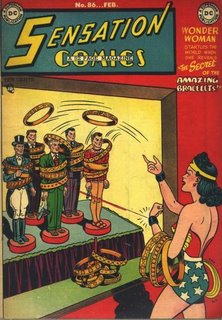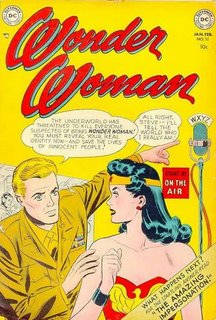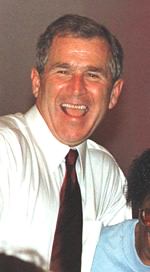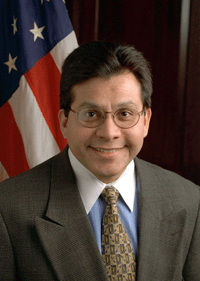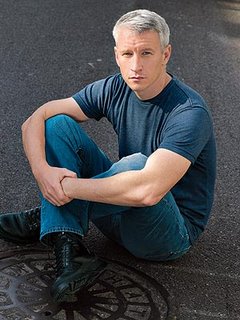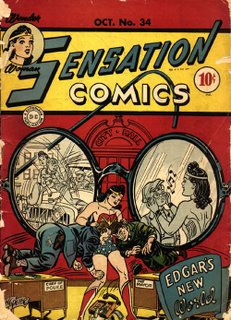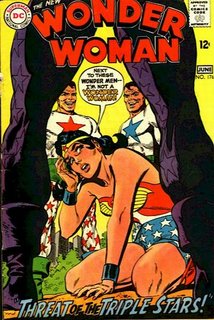 We are in the middle of Hispanic Heritage Month, which runs from September 15 to October 15. To fufill their PSA obligations, this usually sends networks scrambling to try and come up with Latino historical figures important to this nation. In reality, there are lots to choose from, of course. Given that most Americans never really learned about any Latinos in school, however, networks end up choosing some pretty dubious figures. Inevitably we are stuck being associated with Latinos whom we would rather not claim.
We are in the middle of Hispanic Heritage Month, which runs from September 15 to October 15. To fufill their PSA obligations, this usually sends networks scrambling to try and come up with Latino historical figures important to this nation. In reality, there are lots to choose from, of course. Given that most Americans never really learned about any Latinos in school, however, networks end up choosing some pretty dubious figures. Inevitably we are stuck being associated with Latinos whom we would rather not claim. One of the perennial favorites tends to be Fray Junípero Serra. Popular culture often credits Serra with “founding” [Alta] California. Of course, such an interpretation presumes that Native Americans who already resided in Alta California were unfounded.
Without doubt, Serra had energy and did establish an astounding string of
Serra had an obsession for Franciscan friars who ventured into places like New Mexico in the previous century. Seventeenth-century missionaries who found themselves
Times had changed, though, by the time Serra came on the scene. The eighteenth-century had that pesky title of the “Age of Enlightenment.” Throughout Spain and its colonies (including New Mexico), people shunned the excesses of the previous century. Not good ol’ Junípero, though. One could imagine a typical conversation at the annual Missionary Convention, probably held in Las Vegas. “Oh, Junípero,” one of his colleagues would say, “You aren’t really wanting to get your body filled with arrows like Saint Sebastian, are you? That is so 1680. Oh.My.God. Is that a hair shirt? Where did you even get that? You crazy.”
What did the Catholic Church do with a clergy man known to be a bit out of his head? Of course, they kept transferring him. Eventually, he ended up in Alta California, much to the chagrin of the Pomo.
Yeah, that’s who we get for Hispanic Heritage Month: Looney, itchy, Indian-enslaving Junípero Serra. He did not even come from Latin America, by the way. He was born in Spain. Of course, American High Schoolers’ knowledge of geography leaves them unable to tell the difference between Spain and Mexico on a globe – so it really doesn't make a difference I suppose.
Don’t mistake my writing this with surprise that the mass media has yet to come to terms with Latinos in the U.S. Almost every night at the gym I am subjected to Lou Dobbs’ hysterical paranoia over Mexican immigration. I have had an ambivalent relationship with the media almost literally since I was born.
Just a few months after my glorious entrance into this world (the day the earth shook with goodness), NBC debuted the television program Chico and the Man. Not since Ricky Ricardo had a Latino had a major role on a televison show. This time, the network promised that the show would be “different.” Chico and the Man, network executives claimed, acknowledged the Chicano movement. NBC said they listened to demands of young Mexican Americans everywhere for more representation. It would offer a show that spoofed racist assumptions about Mexican Americans in the same spirit as All in the Family.
NBC might have listened to the angry voices in the Chicano movement, but clearly they were tone deaf. The resulting show really just gave us another “good minority” who happily enjoys his own oppression. Even the title character, “Chico,” was another way of naming all Latino men “Boy.”

By the time I had any memories of Chico and the Man, it had already gone to syndication. My parents, though, had this notion of “supporting” anything that had prominent Latino figures in it. Supporting, in this case, meant watching. Besides Chico and the Man was basically the only thing with a prominent Latino figure on television, at least until Lynda Carter appeared in Wonder Woman – Yep, she’s one of us. Surprised? We weren’t.
For those who never saw Chico and the Man, the premise went like this: Chico, played by the stand-up comic Freddie Prinze, doesn’t believe that “the man,” played by Jack Albertson, is really as miserable as the entire barrio claims. Sure, Ed (the man) constantly berates Mexicans/Mexican Americans, uses derogatory terms like “beaner,” and generally shows himself to be hateful to all Latinos. Ed says that back in his day, “Mexicans knew their place: Mexico.”
Chico, though, is a Chicano with a heart of gold (and a Silver Star from his duty in Vietnam!). No matter how many times Ed (the man) tells Chico to shove off, he just keeps coming back for more. Ed could be spiteful and hideous, but Chico never got fed up or even annoyed. Chico just kept smiling and cracking jokes. He is glad, glad, GLAD to be helping Ed (the man).
Chico’s only ambition in life was to work in Ed’s garage. In fact, he liked it so much that he worked for free! Like all good Chicanos should, Chico makes it his life mission to help the man. He starts by breaking into Ed’s garage in the middle of the night so that he can clean it. He even put flowers out in honor of Ed’s deceased wife.
Not earning a direct paycheck from Ed makes it tough for Chico to, you know, eat and stuff. Not to be dissuaded by pesky poverty, though, the selfless Chico more than happily takes up residence in an abandoned van. He cheerfully takes baths with a hose in the men’s room sink. No, I am not making this up – That is literally the pilot episode.
Chico, of course, was the “exceptional” Mexican American figure in the show. All of the other Latinos who surrounded Chico lived up to the usual stereotypes. His father deserted Chico when he was a youngster (though he later shows up in the third season and turns out to be Cesar Romero and a wealthy business man (in that order)). Chico’s best friend, Mando, always has a scheme at play. None of the other Latinos who appear in the show ever seem to have jobs. Only Chico – and he, as we already established, works for free!
Even the theme song, belted out by none other than José Feliciano, calls for Chico to “not be discouraged because the man ain’t so hard to understand.” Yeah, you pesky Chicano radicals wanting equality and stuff. What’s your problem? The man has it tough too! It ain’t easy out here for the man. The song also explicitly tells Chico that “you can lend a helping hand” to the man.
Chico told young Latinos everywhere to not rock the boat. Keep quiet, be a doormat for the man, and, though deferred, gratification will come your way. And we thought Serra was a flagellant!
Because of Chico and the Man, and maybe Chico’s extremely tight jeans, I have always had a peculiar interest in Freddie Prinze. It became even greater when I found out that Prinze was of mixed ancestry (Just like me!). Prinze was half Euro-American and half Puerto Rican (Not like me -- Mexican/Irish Ameican). Contrary to popular belief, Prinze was not Chicano – He just played one on t.v. Apparently the producers of the show figured that all Latinos were interchangeable. Puerto Rican? Mexican American? Whatever.
Before Chico, Prinze had been an extremely popular comic. His routines focused on the foibles of racism and being of mixed ancestry. Imagine a 1970s Puerto-Rican version of Dave Chappell. Prinze gained tremendous fame and even landed stints guest-hosting the Tonight Show for Johnny Carson.
He also became embroiled in drugs sometime during the filiming of Chico and the Man. Many people suggest that the drugs led to his suicide. I, on the other hand, tend to point to playing Chico as the potential cause for the suicide. Interestingly, in the last episode that Prinze filmed the day he shot himself, Chico finally tells Ed (the Man) that he has had enough of being mistreated. Of course, later in the episode, Chico sort of forgot about it and throws Ed (the Man) a big party.

Perhaps as a good bookmark, Prinze’s son, Freddie Prinze, Jr. tried to launch his own sitcom this past year. After Prinze’s death, his ex-wife took their young son the only place in the U.S. that many Latinos considered a safe zone: New Mexico. Freddie Prinze, Jr. grew up in Albuquerque (Just Like Me!). He, though, went to the "rich" high school (La Cueva). I did not.
Prinze, Sr. built a career on playing with his Latino identity. Prinze, Jr, however, frequently shunned being identified as “Latino.” At least he avoided it until it seemingly became marketable. Then he was more than happy to try to cash in on his father’s name and heritage with his own television program. Mercifully this show only lasted one season.
I thought by 2006 that network television would give us a better and more diverse vision of Latinos. Instead, we are left with the same sparse and recycled images that I had when I was three years old.
